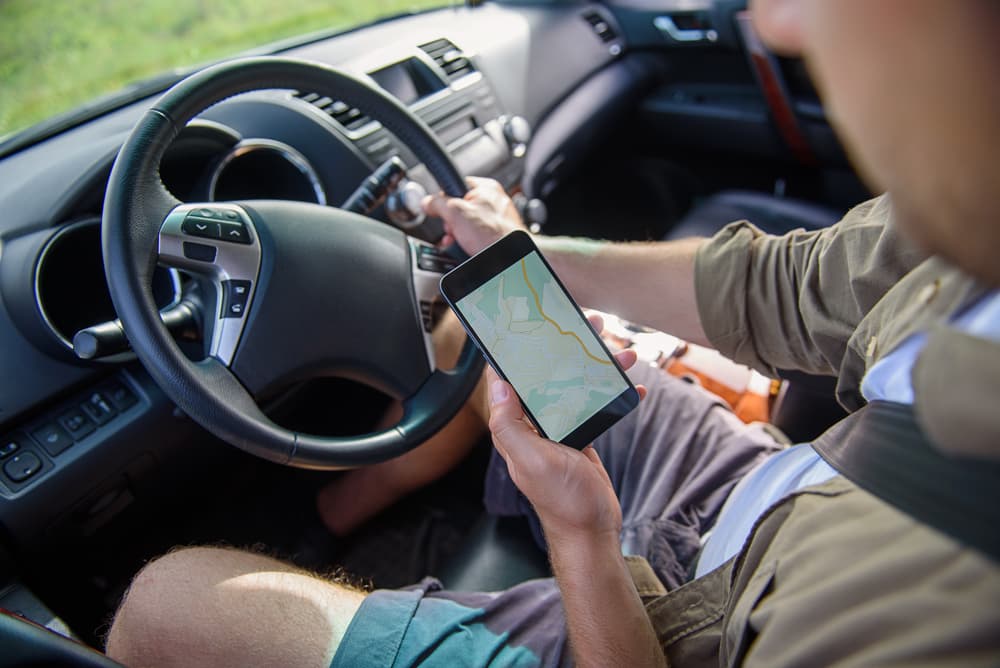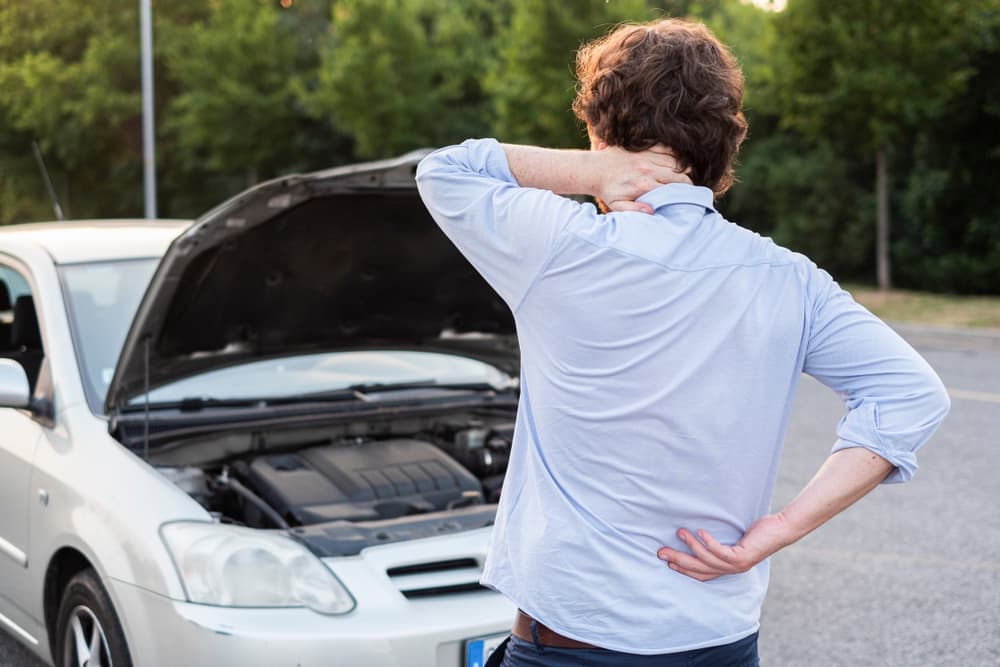After a rideshare accident, you can sue the driver, the rideshare company, or another at-fault party to recover money for your losses. The path to compensation involves understanding who is responsible and navigating a complex insurance system.
A rideshare accident claim is different from a typical car wreck case. The driver's relationship with the company and the specific insurance policies add layers that affect your claim. A Chicago uber accident attorney can untangle the mess and help you file a claim for compensation.
Who May Have a Claim After a Rideshare Accident?

When a rideshare vehicle is involved in a crash, it's not just the passenger who might get hurt. Many different people may suffer injuries and have the right to file a claim for compensation. The at-fault party's insurance is responsible for the damages of all injured victims.
These victims may include:
- Rideshare Passengers: Uber or Lyft passengers may seek compensation if their driver's negligence caused the crash or if another driver was at fault.
- Other Motorists/Passengers: Drivers and passengers in other vehicles struck by a negligent rideshare driver may file a claim for their injuries and vehicle damage.
- Pedestrians: A pedestrian hit by a rideshare car can file a claim.
- Cyclists: Bicyclists who are struck and injured by a careless rideshare driver have the same right as any other victim to pursue compensation for their medical bills and other losses.
Identifying Who Is Responsible for Your Injuries

Your lawyer must show that the driver was negligent in order to have a successful rideshare accident claim. Negligence means the driver failed to use reasonable care, and that failure caused your injuries. Their actions or inaction directly led to the crash.
Determining who is at fault is the foundation of any accident claim, but liability isn't always straightforward in a rideshare crash. It might rest with your rideshare driver, another motorist, or a combination of parties.
The Rideshare Driver's Responsibility
Your rideshare driver has a duty to operate their vehicle safely. If they cause a crash through negligence, they are a responsible party. This includes actions like speeding, distracted driving, or violating traffic laws on busy Chicago streets like Michigan Avenue or the Dan Ryan Expressway.
Even if the driver is at fault, their personal car insurance likely won't cover the accident. Most personal policies have an exclusion for commercial activities like driving for Uber or Lyft. This is where the rideshare company's insurance typically steps in.
The Role of Uber or Lyft’s Insurance
Rideshare companies like Uber and Lyft provide substantial insurance coverage, but it changes depending on the driver's status in the app. This creates different phases of coverage.
The App Is Off
When a rideshare driver isn’t logged into the app, they’re just a regular driver. If they get into an accident, only their personal auto insurance applies. The rideshare company has no involvement or financial responsibility for any injuries or damages.
Logged in and Awaiting a Request
This phase begins when a driver logs into the app and is available to accept a ride but hasn’t yet accepted your request. In this period, if the driver causes a crash, the rideshare company’s contingent liability coverage applies, but only if the driver's personal insurance denies the claim.
A Trip Is in Progress
This phase offers the highest level of protection and begins the moment the driver accepts your ride request. It covers the entire duration of the trip, from the driver being on their way to pick you up to the moment you are dropped off at your destination.
During this time, the rideshare company’s full commercial insurance policy is in effect. This policy provides at least $1 million in third-party liability coverage and covers your injuries if you’re hurt as a passenger due to your driver's negligence.
It also includes Uninsured/Underinsured Motorist (UM/UIM) coverage to protect you if another at-fault driver has little or no insurance.
When Another Driver Is at Fault
Sometimes, another motorist causes the crash, not your rideshare driver. For example, a driver might run a red light at an intersection in Lincoln Park or make an unsafe lane change near Millennium Park, striking your Uber or Lyft.
In these situations, the at-fault driver is the primary party responsible for your injuries, and you would file a claim against that driver’s auto insurance policy first.
If that driver is uninsured or their policy limits are too low to cover your injuries, the rideshare company’s UM/UIM coverage may apply. This provides a crucial safety net for passengers.
Navigating the Complex Insurance Process
After a wreck involving a rideshare vehicle, you’ll likely deal with large, corporate insurance carriers. These companies are focused on their bottom line, not on paying you the full amount you deserve. A rideshare accident lawyer can take this burden off your plate.
Dealing With Multiple Insurance Companies
A rideshare accident case frequently involves communicating with several insurance companies at once. You might be dealing with the at-fault driver's insurer and the rideshare company's insurer simultaneously. Each company has its own adjusters and legal teams working to protect its interests.
This process is confusing and requires careful information management. Any statement you give to one adjuster may be used by another to reduce the value of your claim.
The First Settlement Offer
Insurance companies often make a quick, low settlement offer soon after an accident. They hope you'll accept it before you understand the full extent of your injuries and losses. These initial offers rarely account for future medical care, lost earning capacity, or your full pain and suffering.
Accepting a lowball offer closes your claim permanently. You give up your right to seek further compensation, even if your medical condition worsens later. Always review any settlement offer with a lawyer.
Potential Compensation if You Sue the Rideshare Driver After an Accident
You can sue the rideshare driver after an accident if they acted negligently, pursuing compensation for all the ways the crash has affected your life. This compensation, known as damages, is divided into two main categories: economic and non-economic.
Calculating these damages accurately is a key part of building a strong claim.
Economic Damages
Economic damages are the measurable financial losses you've suffered from the accident. They’re meant to reimburse you for out-of-pocket costs and financial setbacks. It's vital to keep detailed records of these expenses.
A claim for compensation after a rideshare accident covers specific financial losses. These include:
- Medical Bills: This covers all costs related to your medical treatment, from the initial emergency room visit to ongoing physical therapy and future surgeries.
- Lost Wages: You can recover the income you lost from being unable to work while recovering from your injuries.
- Future Lost Earning Capacity: If your injuries prevent you from returning to your old job or diminish your ability to earn a living, you may seek compensation for this future loss.
Non-Economic Damages
Non-economic damages compensate you for the intangible, personal losses from the accident. While these losses don't have a direct price tag, they’re a significant part of the harm you've experienced. They acknowledge the human cost of the crash.
A settlement or verdict may account for:
- Pain and Suffering: This compensates you for the physical pain and emotional distress caused by your injuries.
- Loss of Enjoyment of Life: If your injuries stop you from participating in hobbies and activities you once loved, you can seek compensation for this loss.
- Disfigurement and Scarring: Compensation is available for permanent scarring or disfigurement resulting from the accident.
How a Lawyer Helps You Sue the Rideshare Driver After an Accident

A lawyer acts as your advocate, handling the legal burdens so you can focus on your recovery. They work to protect your rights and fight for the compensation you need.
Investigating the Crash
An attorney gathers all evidence to build a strong case, including obtaining the police report, speaking with witnesses, and securing any available crash traffic or dashcam footage.
They’ll document the scene, whether on a residential street in the Gold Coast or a busy highway like the Kennedy Expressway.
Managing Communications
A lawyer takes over all communication with insurance adjusters and other attorneys. This prevents you from making statements that an insurer might twist to deny or devalue your claim. They handle the aggressive negotiation tactics of insurance companies.
Calculating the Full Value of Your Claim
Determining the true value of a claim goes beyond adding up current medical bills. A lawyer works with medical and financial experts to understand the full scope of your losses, including the need for future medical care and the long-term impact on your career.
Their diligent work accounts for all economic and non-economic damages.
Fighting for a Fair Settlement
Most personal injury cases resolve through a negotiated settlement. Lawyers are skilled negotiators who will fight for a settlement that covers all your damages. If the insurance company refuses to make a fair offer, your attorney can take your case to court.
FAQ for Suing a Rideshare Driver After an Accident
What Should I Do Immediately After a Rideshare Accident?
If you’ve already received medical care, focus on gathering and protecting all information related to the accident. Open the Uber or Lyft app and screenshot your trip receipt. This contains the driver's name, vehicle information, the date, and the route, all key pieces of evidence.
Next, organize all the documents from your medical treatment. Keep your emergency room discharge papers, any notes from your doctor, and all related bills together in one safe place. If a police report was filed for the crash, obtain a copy from the responding police department.
Finally, don’t give a recorded statement to an insurance adjuster who contacts you before you speak with an attorney.
Who Pays for My Medical Bills and Lost Wages?
Ultimately, the at-fault party's insurance is responsible for your medical bills and lost wages. Initially, your own health insurance may cover medical treatment. Your personal injury claim seeks to recover compensation for these costs and reimburse any insurer who has paid for your care.
How Is a Rideshare Accident Different From a Regular Car Accident?
Rideshare accidents are more complex because they involve the rideshare company and its specific commercial insurance policies. Determining which insurance policy applies depends on the driver’s status in the app at the time of the crash.
These cases often involve multiple layers of insurance and potential defendants.
What Is the Deadline for Suing a Rideshare Driver After an Accident in Illinois?
In Illinois, you generally have two years from the accident date to file a personal injury lawsuit. This is known as the statute of limitations. You’ll likely lose your right to pursue compensation if you miss this deadline.
There are some exceptions to this deadline, so contact a personal injury lawyer immediately to protect your claim.
Can You Sue the Rideshare Driver After an Accident Even if Another Driver Was at Fault?
If another driver caused the accident, your primary claim is against that driver. However, if that at-fault driver is uninsured or underinsured, you may be able to make a claim against the rideshare company's insurance policy. An attorney can help you identify all available sources of compensation.
Seek Justice With LegalRideshare Injury Lawyers
You don't have to face a massive corporation and its insurance company alone. If a negligent rideshare driver injured you, you can seek justice and compensation for the harm you've suffered. A dedicated legal team can lift the burden from your shoulders and fight to make things right.
If a rideshare accident in Chicago has left you injured and uncertain what to do next, take the first step toward protecting your rights. Rideshare accident lawyers understands these cases' unique challenges and is ready to help.
Call us at (312) 767-7950 for a free, no-obligation consultation today.